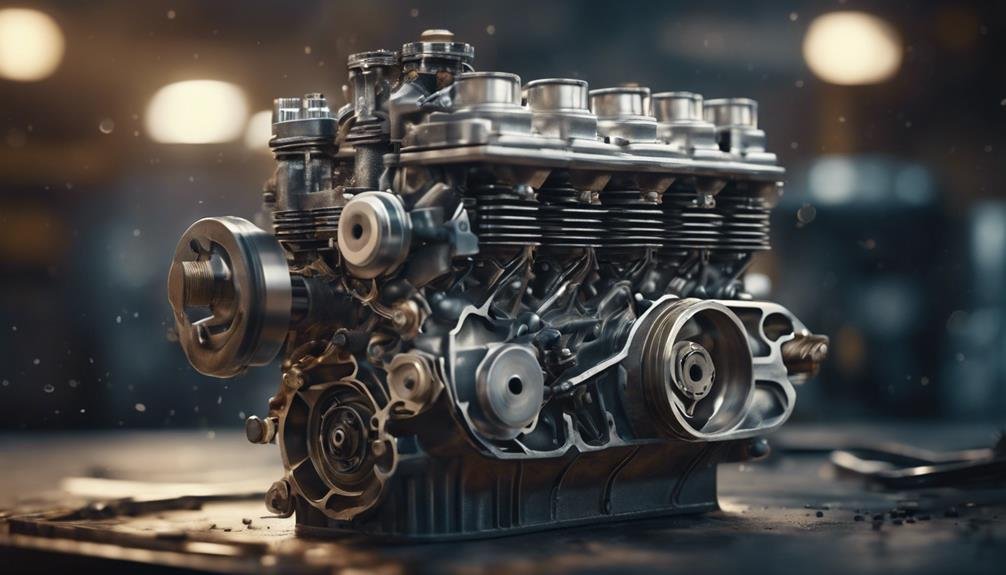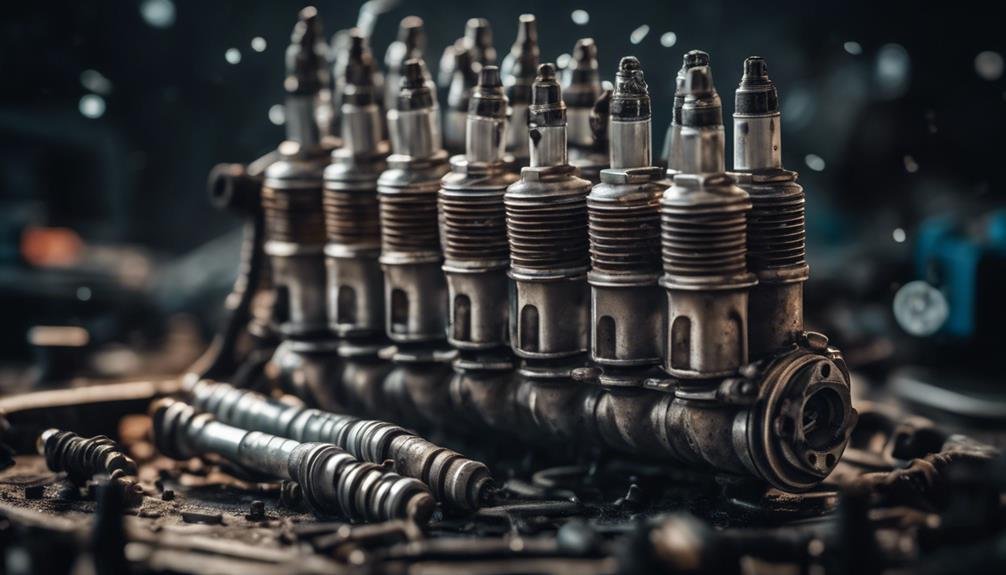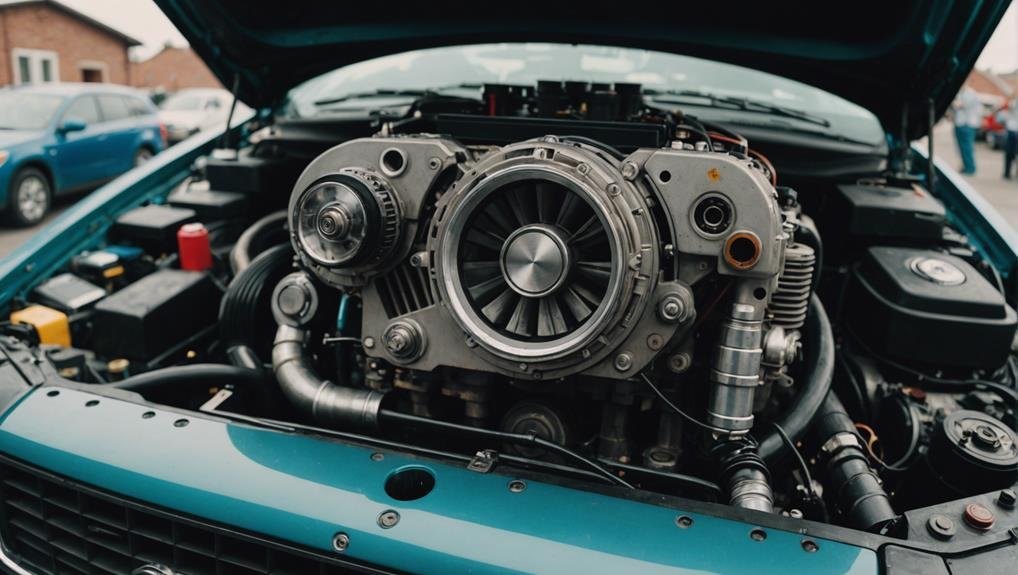When you hear a persistent knocking or pinging sound coming from your engine, it's often a sign that there's an underlying issue that needs to be addressed. This knocking sound can be caused by different factors, including poor fuel quality, leading to pre-ignition and engine knocking, or a worn cambelt, disrupting internal combustion timing. Low oil pressure, valve lifter failure, and old spark plugs can also contribute to the knocking noise. Identifying the root cause is essential to preventing further engine damage. As you investigate the possible reasons behind the knocking sound, you'll want to examine each of these potential causes further to determine the best course of action for your vehicle.
Key Takeaways
- Poor fuel quality can cause engine knocking due to pre-ignition and combustion issues, emphasizing the importance of using the correct fuel type.
- A worn cambelt can disrupt internal combustion timing, leading to knocking sounds, and should be replaced every 40,000 to 100,000 miles.
- Low oil pressure can cause engine knocking due to insufficient lubrication, highlighting the need for regular oil changes and checks.
- Valve lifter failure, often caused by dirty oil, can cause knocking sounds, and prompt attention is necessary to prevent further damage.
- Worn-out spark plugs can cause misfiring and knocking sounds, emphasizing the importance of regular spark plug maintenance every 30,000 miles.
Poor Fuel Quality Causes Knocking
Using low-quality fuel can lead to pre-ignition and engine knocking, which can ultimately damage your engine if left unchecked. This is because poor fuel quality can cause combustion issues, resulting in knocking sounds.
Additionally, using the wrong octane fuel can exacerbate the problem, leading to detonation knock, which affects engine performance and can lead to long-term engine damage. It's important to use the correct fuel type, as recommended by the manufacturer, to prevent knocking caused by poor fuel quality.
Engine knocking due to poor fuel quality can be harmful to your engine's health, causing irreparable damage if left unaddressed. It's crucial to choose the right fuel type to prevent pre-ignition and engine knocking.
Worn Cambelt Leads to Knocking
A worn cambelt can cause your engine to knock, as it disrupts the delicate timing of the internal combustion process, leading to potentially catastrophic consequences if left unchecked.
When your cambelt wears out, it can't synchronize the movement of engine components properly, resulting in improper timing and engine knocking. This knocking sound coming from your engine is a warning sign that something is amiss, and neglecting it can lead to severe engine damage and costly repairs.
Typically, cambelts should be replaced every 40,000 to 100,000 miles to prevent engine damage. The average cost of replacing a worn cambelt is around £426.76, varying based on the vehicle and labor costs.
It's important to address a worn cambelt promptly, as it can cause engine knocking, which can escalate into more severe problems. By replacing your cambelt on time, you can prevent engine damage and ensure your car runs smoothly.
Don't ignore that knocking sound – it's your engine's way of telling you something is wrong.
Low Oil Pressure and Knocking

If you've ruled out a worn cambelt as the cause of the knocking sound, it's time to investigate another common culprit: low oil pressure. Low oil pressure can lead to engine knocking due to insufficient lubrication of components, which may indicate potential damage to the engine.
| Symptom | Cause | Consequence |
|---|---|---|
| Knocking sound | Low oil pressure | Insufficient lubrication |
| Sudden drop in oil levels | Oil leak | Engine damage |
| Temporary fix | Topping up oil | Masking the issue |
Topping up oil may temporarily mask the issue, but addressing the underlying problem is vital. A sudden drop in oil levels suggests a leak that needs immediate attention to prevent engine damage. Proper lubrication through regular oil changes is crucial to prevent low oil pressure and engine knocking. Don't overlook the importance of regular oil changes to prevent engine damage.
Valve Lifter Failure and Knocking
Dirty oil clogging your valve lifters can cause them to malfunction and produce that annoying knocking sound in your engine. This is a common issue that can lead to valve lifter failure, which in turn can cause the knocking sound you're experiencing.
Using the incorrect oil grade can also contribute to valve lifter failure, as it may not provide the necessary lubrication for your engine's components.
Here are some key points to keep in mind:
- Valve lifter failure can be caused by dirty oil, which clogs the lifters and prevents them from functioning properly.
- Using the wrong oil grade can lead to valve lifter failure, as it may not provide the necessary lubrication for your engine's components.
- In some cases, cleaning agents may help resolve valve lifter issues, but it's important to consult a mechanic for a proper diagnosis and repair estimate.
If you suspect valve lifter failure is causing the knocking sound in your engine, it's vital to address the issue promptly to prevent further damage. Consult a mechanic to diagnose the problem and provide a repair estimate. Don't ignore the knocking sound, as it can lead to more severe engine damage if left unchecked.
Old Spark Plugs Cause Knocking Sound

You might be surprised to learn that worn-out spark plugs are a common culprit behind the knocking sound in your engine. As spark plugs mature, they can cause misfiring in the engine, leading to the knocking sounds you're experiencing.
When spark plugs misfire, they create uneven combustion, which contributes to the knocking noise. Moreover, old spark plugs can lead to ignition issues, resulting in engine stalling and illuminating the check engine light.
To avoid these problems, it's crucial to maintain your spark plugs properly. The recommended replacement interval is every 30,000 miles to prevent engine knocking. Neglecting spark plug maintenance can lead to more severe engine damage down the line.
Bad Fuel Pump Leads to Knocking
A faulty fuel pump can wreak havoc on your engine, causing it to knock and sputter due to an imbalanced air-fuel ratio. This imbalance occurs when the fuel pump fails to provide the necessary amount of fuel to the engine, resulting in a rich fuel mixture that leads to knocking sounds.
When your fuel pump malfunctions, it can't supply the engine with the right amount of fuel, causing it to run rich, which in turn leads to engine knocking. Here are some key points to keep in mind:
- A bad fuel pump can lead to an inadequate fuel supply, causing engine knocking.
- Engine running rich due to a malfunctioning fuel pump can result in knocking sounds.
- The replacement cost for a bad fuel pump is typically around £343.95, making it a relatively affordable fix.
Don't hesitate to address a faulty fuel pump, as it's crucial for proper engine function. Ignoring the issue can lead to further damage and more costly repairs down the line. By recognizing the signs of a bad fuel pump and taking prompt action, you can prevent engine knocking and keep your car running smoothly.
Frequently Asked Questions
Why Is My Car Making a Knocking Noise When I Drive?
When you drive, you're wondering why your car's making that annoying knocking noise. It's likely due to worn-out suspension parts or damaged engine components, and ignoring it can lead to costly repairs, so get it checked ASAP!
What Does It Mean When You Hear Knocking in Your Car?
When you hear knocking in your car, it means there's an issue that needs attention, like improper combustion, worn-out bearings, or damaged connecting rods, which can lead to costly repairs or even engine failure if ignored.
How Do I Fix the Knocking Sound in My Engine?
You're likely wondering how to fix the knocking sound in your engine. Start by checking your spark plugs, fuel quality, and cambelt condition; addressing these issues can resolve the problem, so get to work and avoid costly repairs!
Is Engine Knock Serious?
You need to take engine knock seriously, as it can lead to significant engine damage, costly repairs, or even engine failure if left unaddressed, so don't ignore it, and address it promptly to prevent further issues.
Conclusion
So, you've identified the knocking sound in your car, but what's causing it?
It could be due to poor fuel quality, a worn cambelt, low oil pressure, valve lifter failure, old spark plugs, or a bad fuel pump.
Now that you're aware of these potential causes, take the next step and investigate further to pinpoint the root of the issue, ensuring you address the problem before it leads to more costly repairs or even engine damage.
